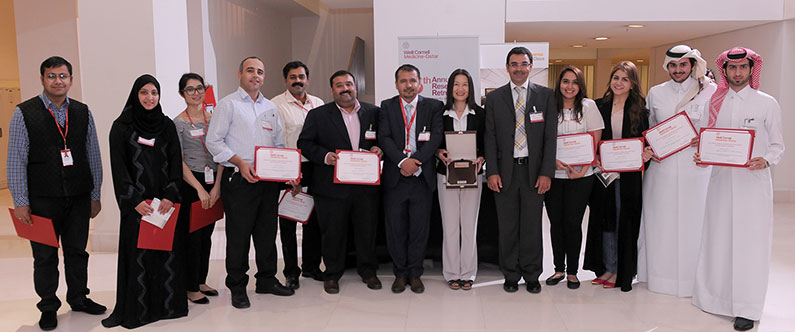Research Retreat looks forward to bright future in R&D
 Dr. Khaled Machaca, associate dean for research, with the winners of the poster exhibition.
Dr. Khaled Machaca, associate dean for research, with the winners of the poster exhibition.
The latest developments in biomedical research were showcased as the scientific community gathered at WCM-Q for the college’s 6th Annual Research Retreat.
More than 200 leading scientists from WCM-Q and other national elite institutions convened to discuss the many pioneering research projects being conducted at the college and in collaboration with local stakeholders including Hamad Medical Corporation (HMC), Hamad Bin Khalifa University (HBKU) and Qatar Biomedical Research Institute (QBRI), which include investigations into type-2 diabetes, cardiovascular disease, obesity and DNA analysis of the Qatari genome, among many others.
Perhaps the key theme to emerge from the Research Retreat this year was a commitment to continue WCM-Q’s drive to translate cutting-edge research into commercially valuable intellectual property (IP) that will boost Qatar’s transition to a sustainable knowledge-based economy founded on a sustainable national research and development (R&D) agenda.
Dr. Khaled Machaca, associate dean for research at WCM-Q, said:
“The Research Retreat is critical for the college because it really highlights the cutting edge science that is ongoing here at all levels of our research enterprise, including, faculty, post-doctoral associates, research specialists and students. This is really important for the future of scientific research in Qatar.
We are now entering a new phase in research and development, which is very important for Qatar at the national level. In the initial phase we established a strong research program and attracted top scientists from all over the world, thanks to the generous support of Qatar Foundation and Qatar National Research Fund.
Now it’s about using that continued support to leverage the facilities and capabilities that have been established in order to develop IP that can be the engine of the emerging knowledge-based economy of Qatar, delivering sustainable economic growth in the long-term.”
The one-day event featured presentations of cutting-edge research by six leading scientists from WCM-Q, Weill Cornell Medicine in New York and HMC. Dr. Abdul-Badi Abou-Samra, chair of the Department of Internal Medicine at HMC, spoke about collaboration between WCM-Q and HMC researchers.
The keynote address was given by guest speaker Dr. Raymond DuBois, director of the Biodesign Institute at Arizona State University, who explained the role of inflammation in the progression of colorectal cancer and the opportunities presented by the establishment of a purpose-built research facility supported by government.
Additionally, presentations of important new discoveries were given by WCM-Q researchers Dr. Steven Hunt, professor of genetic medicine; Dr. Hani Najafi, assistant professor of cell and developmental biology; Dr. Karsten Suhre, professor of physiology and biophysics; Dr. Rayaz Malik, professor of medicine, with Dr. Ashfaq Shuaib, head of neuroscience at HMC; and Dr. Ronald Crystal, chair of genetic medicine at Weill Cornell Medicine in New York.
The Research Retreat also featured a total of 84 poster presentations by research specialists, students and postdoctoral fellows explaining the findings of projects conducted at the university over the past year. The event closed with the announcement of the winners of the poster presentation in three categories.
First place in the student category was awarded jointly to second-year medical students Eman Mosleh, for her poster presentation of a project that investigated epithelial cells in relation to lung cancer, and Abdulaziz Al-Thani, for his presentation about gene therapy for peanut-induced anaphylaxis.
In the research specialists’ category Iman Al-Azwani came first with a poster about genetic profiling of the critically endangered Spix’s macaw, which is native to Brazil. In the postdoctoral fellows category, Vimal Ramachandran was first with a poster about the effect on cholesterol of a specific type of microRNA.
Dr. Javaid Sheikh, dean of WCM-Q, said:
“I have been very impressed with the quality of the research presented here today and hugely encouraged by the appetite for inter-organizational collaboration that is in evidence.
R&D is truly the backbone of a globally competitive, knowledge-driven economy and events such as the Research Retreat serve as a powerful vehicle for encouraging partnerships among institutions and individuals, which is so crucial for the support of innovation.”